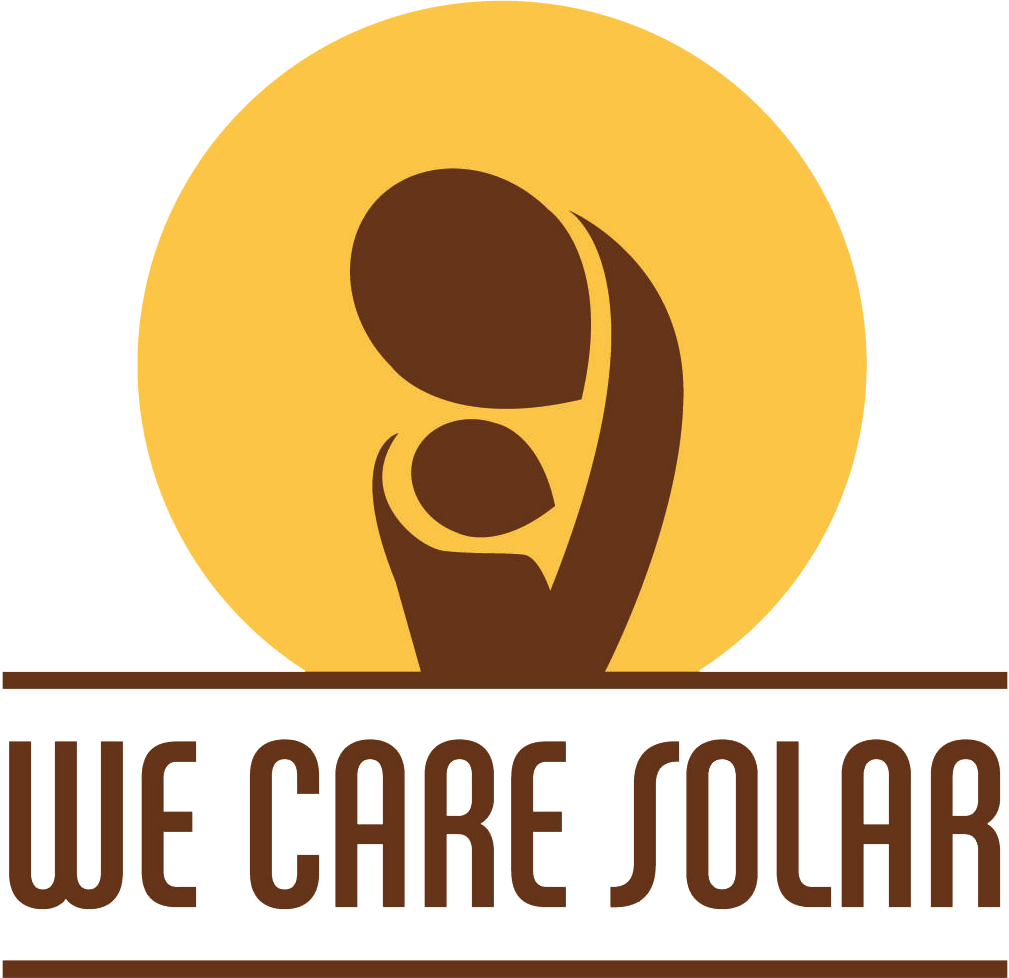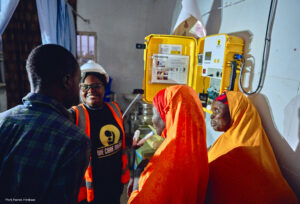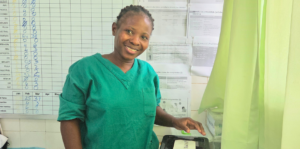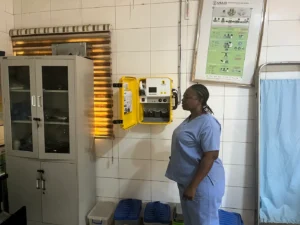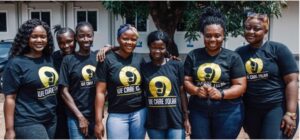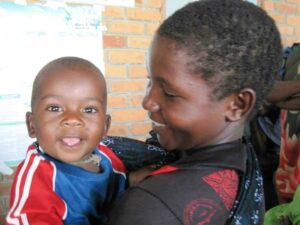Originally posted – April 18th on alignmnh.org
By: AlignMNH Secretariat and Dr. Laura Stachel
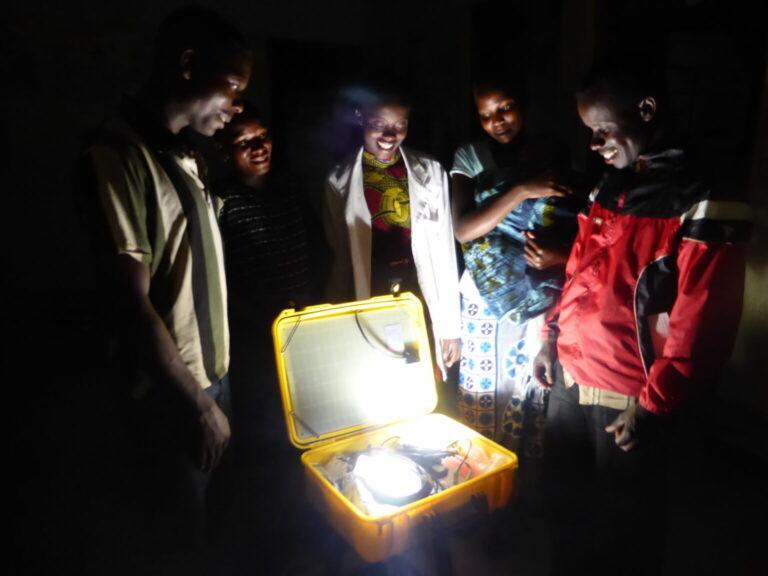
The We Care Solar Suitcase® provides solar-powered medical lighting and power for communication and medical devices to last mile health facilities. With documented success in multiple countries, this innovation is one approach to providing clean, renewable energy and achieving universal electrification to healthcare facilities.
The We Care Solar Suitcase® was one of 58 solutions presented at the IMNHC 2023 Technical Marketplace, which showcased promising maternal and newborn health interventions and innovations in an engaging and interactive format. The various exhibits and demonstrations provided an opportunity for conference attendees to learn and be inspired, while serving as an opportunity for presenters to share, collaborate, and benefit from collective thinking.
The global community is falling far short of the 2030 Sustainable Development Goals, especially for the health and well-being for women, newborns, and children, and for access to clean, renewable energy. The goal of achieving universal electrification of healthcare facilities in sub-Saharan Africa continues to be daunting. Power Africa estimates that 100,000 rural health facilities lack reliable access to the electricity and digital connectivity they need to equitably serve their communities.
There is a growing coalition of partners in the health and energy sectors seeking to end energy poverty in health facilities. One organization working to provide clean energy for maternal-newborn healthcare facilities is We Care Solar. Through their Light Every Birth initiative, they are building a global community of individuals, partners, philanthropists, and foundations who believe:
- Every woman has a right to a safe delivery.
- Every health center is entitled to reliable light and electricity.
- Clean, solar power offers an immediate and sustainable solution to this global challenge.
We Care Solar has a portable electric system, the We Care Solar Suitcase®, that provides last-mile health facilities with highly efficient medical lighting and power for mobile communication and small medical devices. Their success in their first four Light Every Birth countries—Liberia, Uganda, Zimbabwe, and Sierra Leone—has shown that they have a scalable and feasible model to achieve a future where every health worker has the “power to save lives,” where every woman can access safe childbirth, where fossil fuels can be phased out, and where women are equal partners in promoting a cleaner, healthier environment.
We Care Solar presented their Solar Suitcase at IMNHC 2023’s Technical Marketplace. Since then, the product has been featured by the Wilson Center, an op-ed about it has been published in AllAfrica, and co-founder Dr. Laura Stachel was awarded AARP’s 2024 Purpose Prize®.
We asked Dr. Stachel some questions about the Solar Suitcase’s development, research, and future expansion plans.
AlignMNH: Please give a brief background for readers who have not heard of the Solar Suitcase.
Laura Stachel: We Care Solar Suitcases® promote safe motherhood and reduce maternal mortality in energy poor regions by providing health workers with lifesaving light and power. The Solar Suitcase provides reliable medical surgical lighting, mobile communication, and medical devices using clean solar electricity. It is a compact, rugged, institutional-grade solar electric system that includes power generation, power storage, and medical appliances. It is the only renewable pre-wired 12-volt DC power source co-designed by an obstetrician for maternal and newborn care. It has improved the quality and timeliness of care in thousands of last mile facilities.
The newest Solar Suitcase incorporates years of human-centered design field research and features improved functionality, durability, and ease of use. The system is equipped with 70,000-hour medical LED lights, rechargeable headlamps, phone charging, a fetal heart rate monitor, and an infrared thermometer. It is durable and easy to install, operate, and maintain. Solar panels recharge the system fully each day, ensuring light throughout the night. The lithium ferrous phosphate battery is maintenance-free and requires a simple battery change every five years.
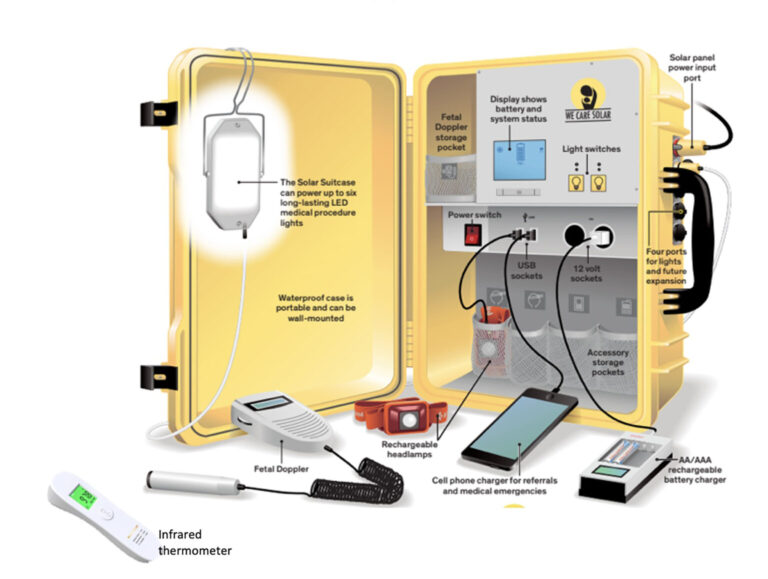
Can you provide details on the research that has documented the impact of the Solar Suitcase?
Qualitative research analyzing the experience of hundreds of health workers in ten countries revealed subjective improvements in capacity to admit patients, diagnose complications, and conduct emergency procedures.
Three program evaluations reported improved maternal-child survival and demand for services when Solar Suitcases were included as part of comprehensive Maternal-Child Health programs in Nigeria, Tanzania and Uganda. This includes AMREF’s three-year, multi-intervention trial of Solar Suitcases in 100 Ugandan health facilities. AMREF reported an 80% increase in night-time deliveries, a 50% decrease in maternal mortality and a 63% decrease in perinatal deaths. Unpublished evaluations by Pathfinder in Nigeria and Tanzania demonstrated similar findings.
A randomized control trial conducted by Harvard School of Public Health and Innovations for Poverty Action used a 36-index quality of care index and reported a 9% improvement in obstetric care and 25-minute cumulative decrease in procedural delays with the Solar Suitcase intervention. They also reported on improved health worker satisfaction, confidence, and ability to conduct emergency obstetric procedures, similar to a separate qualitative study.
With more than 8,650 Solar Suitcases installed globally, We Care Solar is demonstrating the feasibility and reliability of solar for healthcare in resource-poor environments. —Dr. Laura Stachel
In what contexts does the Solar Suitcase prove to be most useful?
The We Care Solar Suitcase® was designed to empower health workers to save lives in energy-deficient health facilities in remote communities, enhancing obstetric and newborn care to promote safe childbirth. Primary beneficiaries include:
- Pregnant mothers and newborns
- Community members needing frontline health services
- Health workers in remote, off-the-grid health centers
- Local health agencies striving to improve maternal and child health care
Are there any limitations or challenges associated with using the Solar Suitcase?
We face the challenges of working in nations with inadequate infrastructure and insufficient budgets. The government health facilities we serve often lack resources for medications, supplies, and equipment. We work in geographies where the terrain is difficult and inclement weather can make roads impassable—just reaching last-mile health centers can pose a sizable hurdle and maintaining technology in remote health centers is even more challenging. To address these challenges, we work closely with government agencies and cultivate a network of experienced regional partners. These partners help us to navigate both the difficult terrain and weather conditions and ensure program sustainability. This requires considerable relationship-building, oversight, training, management, and planning.
As a technology, the Solar Suitcase was designed to be rugged and suitable for institutional use. The power supply is adequate for the customized medical-surgical LED lights, and for charging of phones and small medical devices. We have also conducted a pilot study showing the capacity of the Solar Suitcase to power a highly efficient vaccine refrigerator. That being said, it does not have the capacity to power large medical devices nor support the energy needs of an entire health facility.
Can you talk about how the Solar Suitcase is addressing sustainability and maintenance systems to support longevity of the product?
Sustainability has been a priority for We Care Solar from the very beginning and continues to be an essential component of our programs. We have strengthened our sustainability model by working closely with governments and implementing partners to co-create and implement a sustainability plan specific to each Light Every Birth country. For all programs, we aim for sustainability measures to be in place in the planning stage and support our partners in their efforts to maximize the lifespan of the Solar Suitcases. With more than 8,650 Solar Suitcases installed globally, We Care Solar is demonstrating the feasibility and reliability of solar for healthcare in resource-poor environments.
We Care Solar is committed to ensuring that our Solar Suitcase systems function at peak performance for a decade or more. Implementing programs sustainably requires greater efficiencies for the maintenance and management of the supply chain of spare and replacement parts. With this in mind, we:
- Build capacity of local technicians to maintain and repair Solar Suitcases to promote long-term sustainability and reduce system downtime,
- Set up an electronic system to track inventory, maintenance, and repair of Solar Suitcases to reduce long-term operational costs, allowing us to further support our existing equipment in the field, and
- Provide support and co-create with government officials a plan to transfer program responsibility to the government after completion of Solar Suitcase installations.
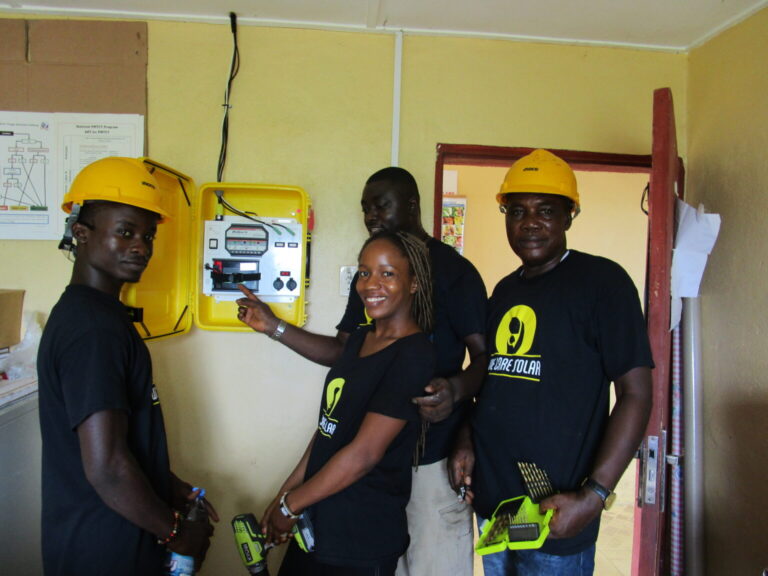
What are the next steps for expanding use of the Solar Suitcase?
Building on the success of our Light Every Birth initiatives in Liberia, Uganda, Zimbabwe, and Sierra Leone, we are employing our strategic 3-phase implementation approach to expand and accelerate our Light Every Birth programming over five new geographies—Nigeria, Tanzania, Malawi, Mozambique, and a Francophone country (we have had requests from the Democratic Republic of the Congo, Burundi, Burkina Faso, Madagascar, and Côte d’Ivoire). We Care Solar tailors our Light Every Birth program roll-out and implementation to the unique needs, populations, resources, and partnership potential of each country. Once implementation of Solar Suitcases is complete, we will transition full ownership of the program to our government partners.
Laura E. Stachel, MD, MPH, DrPH, the Executive Director and co-founder of We Care Solar, is a former obstetrician-gynecologist whose study on maternal mortality in Nigeria alerted her to the challenge of energy poverty in healthcare. She holds an MD from the University of California, San Francisco and an MPH in Maternal and Child Health and DrPH from the University of California, Berkeley. She and her husband, co-founder Hal Aronson, are the force behind the conception of the Solar Suitcase.
Laura was the Associate Director of Emergency Obstetric Research in West Africa for the Bixby Center for Population Health and Sustainability. She was the P.I. on a MacArthur Foundation project on We Care Solar Suitcase usage in Nigeria and Uganda, and was co-investigator for a collaborative Population Council study that assessed the standard of maternity care in Nigerian state hospitals. Laura was a staff researcher at the Blum Center for Developing Economies at U.C. Berkeley. She serves on the Editorial Board for the Berkeley Wellness Letter and co-chaired an international working group on Energy and Health for the UN Foundation.
Laura has won numerous awards including the 2024 AARP Purpose Prize, the 2019 Zayed Sustainability Prize, the 2017 UN Momentum for Change: Lighthouse Award, the 2017 Drucker Prize, Bloomberg New Energy Pioneers, the 2017 National Energy Globe Award, the 2015 UN DESA “Powering the Future We Want” Award, the 2015 UBS Optimus Award, the UCSF Alumni Award, the UC Berkeley School of Public Health Influencers Award, the C3E Leadership in Developing Countries Award, and the Top-Ten 2013 CNN Heroes award.
